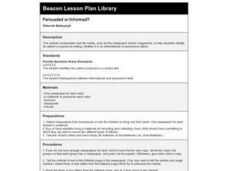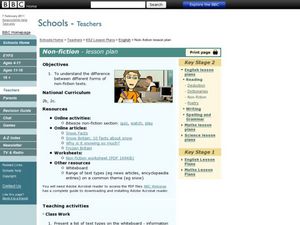Curated OER
Identify Genre, Subgenre, and Author's Purpose
Explore genre, subgenre, and author's purpose in this helpful worksheet. Middle schoolers read several summaries of books and short stories, and identify the genre and subgenre. They also determine if the author's purpose is to...
Curated OER
Author's Purpose
Find the author's purpose in this review worksheet. Fourth graders read each of the three following paragraphs and decide whether the author's purpose is to persuade, inform, or entertain. You could use this activity as a class...
Curated OER
Determining Author's Point of View: The Sneeches
Determine the author's point of view in a text. Young readers read Dr. Seuss' The Sneeches and identify the author's purpose in the story. They identify persuasive techniques in writing, asking and answering questions to better...
Curated OER
Author's Purpose
Read each of the three short passages and decide whether the author's purpose is to persuade, inform, and entertain. After they have identified the purpose, fourth graders explain why they believe that each passage fits that purpose. You...
Curated OER
Author's Purpose
A simple activity for young readers, this introduces the idea of author purpose. Learners analyze various types of texts (newspaper articles, magazines, books, advertisements, etc.) and determine if the author's purpose for writing was...
Curated OER
Author’s Purpose Activity
In this author's purpose worksheet, students read a few sentences about a book and then answer short answer questions about the author's purpose. Students complete 12 questions.
Curated OER
Author's Purpose
How do you determine an author’s purpose? You ask the author, of course. Invite a local journalist into the class to respond to scripted student questions about his/her writing process. A review of basic classroom etiquette is also...
Teach-nology
Author's Purpose
Challenge your class to find the three purposes for writing. After they read three short passages, kids note whether the author's purpose was to inform, persuade, or entertain.
Gourmet Curriculum Press
Author's Purpose
Who knew determining author's purpose could be turned into a game? Four teams compete to correctly identify the author's purpose for writing a series of passages.
Teach-nology
Author’s Purpose: Persuade
Explore author's purpose with an activity about persuasive arguments. After reading a short passage about Spain, learners identify three main passages that the author uses to persuade the reader.
Curated OER
Using Details from Text to Identify Author's Purpose
Explore writing techniques by analyzing newspapers and magazines with middle schoolers. They will collaborate in small groups to read local news stories and identify the main ideas and author's intent. They also utilize an information...
Curated OER
Author's Purpose and Point of View Pretest
In this author's purpose and point of view worksheet, students answer 10 multiple choice questions.
Read Works
Changing An Author's Purpose
Some write to inform, and others to persuade. Show your class the difference between these two purposes with the instructional activity and sample essays provided here. First, model how you might change a few words in order to present a...
Curated OER
What's My Point: Persuasive Writing
Why do readers need to know an author’s purpose? How do you figure out what that purpose is? Guide your pupils through a series of activities that show them how to identify various techniques and structures used in persuasive writing....
Curated OER
Understanding Points of View
Investigate the importance of author's point of view. Young linguists study primary source documents related to the Treaty of Casco Bay. The first source is authored by the Native American Chiefs, the second by an English...
Curated OER
Author’s Purpose
In this literary elements worksheet, students respond to 18 short answer and multiple choice questions regarding the author's purpose in "A World Made Beautiful by Dzine."
Curated OER
Dig A Little Deeper
Here is a great lesson on recognizing events and themes in a story. Students read chapters from a chosen book and then fill out a graphic organizer to further explore the purpose of the chapter. They write the events, themes, author's...
Curated OER
Persuaded or Informed?
Give each learner a newspaper for this instructional activity! As a group, read select editorials and discuss them with your class. Are these articles informational or persuasive? Cut out select editorials and have learners identify the...
EngageNY
Considering Author’s Purpose: Comparing Fictional and Historical Experiences of the Second Sudanese Civil War (Chapters 14 and 15, Plus Rereading “Time Trip,” Continued)
Is that a true story? Readers work to gather evidence for comparing the historical and fictional text Time Trip: Sudan’s Civil War and A Long Walk to Water. Scholars identify the use of real people and experiences versus the use of...
Curated OER
Active and Passive Voice: Finding Examples Online
Incorporate technological fluency with a search for examples of active and passive voice in online resources. Discuss how use of active or passive voice influences mood or tone and contributes to author's purpose. List of...
Curated OER
Find The Hidden Message: Media Literacy in Primary Grades
Learners practice listening to and reading various types of media and text. In groups, learners use video, newspapers, magazines, and more to compare and contrast different types of information. They identify the differences between fact...
EngageNY
Setting Purpose for Research: What are Fair Working Conditions?
Life may not be fair but working conditions should be. Scholars research working conditions at Wegmans by studying the company website. They complete a working conditions anchor chart and discuss their findings in a think-pair-share...
Teaching Tolerance
Using Photographs to Teach Social Justice | Advertisements Promoting Activism
Activism can create real change. Class members examine a series of photographs that represent a different form of activism. Individuals then craft a persuasive speech in which they argue why the photo they chose is the best example of...
Curated OER
Non-Fiction Texts
Third graders examine different types of non-fiction texts. In this non fiction instructional activity, 3rd graders use different types of texts to gather information. Students work in groups to analyze the texts for author's purpose,...

























